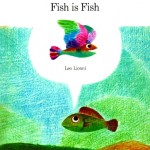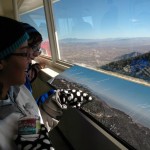It’s warm, but the sun is on the descent. The tall grass is gripping onto the cool wind as it tries to come in off the water. The opening between patches of tall grass is a clear entry point into a reflective, lapping lake. But it isn’t a normal trip to the lake today — no. Instead, you have the luxury of taking a couple kids on their first trip to the lake. You tell ‘em “go play in the lake!”
They hesitate, inch closer, and get their toes into the bank. A smile brightens their face, they give you a thumbs up, sit there about 37 seconds, come back to you, grab a towel and proclaim their done.
What do you say?
How often are students in our classroom getting by with the minimum? How often do students do exactly what we asked, but stop at the water’s edge? If we set up classes where students are driven by compliance, are we doing a disservice to them?
Teaching writing, I often find my students are adhering to rubrics. They do as instructed, but not more. They inhibit themselves. They often are not compelled to do more.
If I tell them an introduction paragraph can be 3 sentences long, most will choose to write 3 sentences only. They also won’t care about the quality because they’re banking on their overworked teacher to lump together all of their minimal effort rubric results into a passing grade — and that’s fine with them.
It has been tempting in the past to see the promising potential of a few stand out students and really focus on giving them meaningful feedback. At least these students want the feedback, they will use it. But that type of approach to teaching is similar to the students who don’t go deep enough — I am not going deep enough.
One way that I really combat this notion of compliance is by making most of our classroom activities not graded. The pay-off of the activity is sharing your product with a partner, group, or class. The pay-off is not a padded gradebook.
This was a hurdle with so much of the last year being online. Students really needed accountability to feel like their participation was worth their time. I got in the habit of returning low effort work and telling students to do it again. I wasn’t going to “grade” their creativity on an activity designed to expand their critical thinking, but I also wasn’t going to accept work below their potential.
Pushing students to be more thoughtful, to be more creative sometimes comes at the expense of time and effort on our parts. It can be easy to fall into compliance grading or multiple choice tests for our own convenience. However, I try my best to remind myself regularly that the point of teaching is not to see 125 students merely dip their toes in the water. Instead, I teach to encourage them to enjoy the lake. I want students to be less timid, mature, and take ownership of their experiences.
When it comes back to the lake, and your kid dips their toe in the water and rushes back to you thinking their lake experience is done, I’m guessing, you aren’t packing it up, and heading home. I bet, given the situation, you’re going to encourage them to wade a bit deeper, swim, splash each other, look for some fish, try to skip some rocks, listen to the breeze, look out as the clouds roll by, and take in the sunset, right?
You didn’t come to the lake to check a box. You came to enjoy the afternoon, right? And the same should be true in our classrooms: we should be enjoying our time with our students and encouraging them to enjoy their time there as well.
Writing is fun, History is interesting, Math is a puzzle, and Science is fascinating! Why would we let our kids do the minimum?
Shouldn’t we be teaching them to learn, explore, create, and splash around?
How do you encourage students to wade into the lake? Tell us about it in the comments!










Comments 1
James, you hit the nail on the head….it costs TIME to get anyone (but especially kids) to get bored enough to get creative. I was in a folk dancing session at a music pedagogy class and the instructor made the comment, “You were just about to get bored enough to get creative.” As a teacher, that seems like such a waste of time, but our students deserve that gift! When I teach singing games with older kids I’ll use the comment from the instructor of that pedagogy class…we’re going to keep going until you get bored enough to get creative.